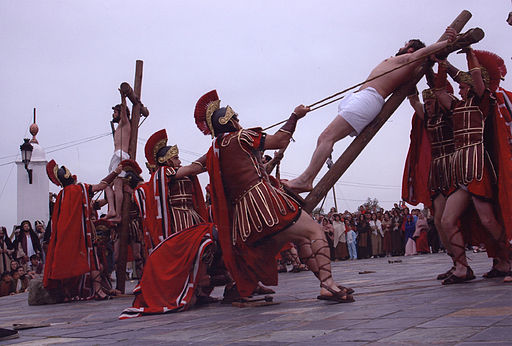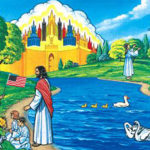Are Stories Of Sacrifice Always Stories of Christ?
Do all stories of sacrifice point to Jesus Christ? I mean, clearly His sacrifice is the central tenet of Christianity. In His death He bore our sins; by His stripes we are healed; through His resurrection power, we are raised to newness of life.
But in stories, are all sacrifices re-telling, in miniature, this same old story upon which our salvation hinges?
Some of the classic fantasy stories have been tied to Christ’s sacrifice: Aslan in Narnia, Gandalf in Lord of the Rings, Harry Potter in Harry Potter.
But there are any number of other stories that also contain a self-sacrificing hero. Katniss in Hunger Games, for example when she went to the games in place of her sister. The hero in Sally Apokadak’s The Button Girl, who appears to sacrifice himself for the king. Shannon Dittmore’s hero in Angel Eyes, and on and on. In most cases, the connection between the sacrificing hero and Christ seems tangible. He willingly puts his life on the line so that another may go free.
I’ve explored this topic of sacrifice and Christ-figures before. Perhaps more pertinent is Shannon McDermmot’s article “What Isn’t Christian Fiction” in which she says
I’ve heard of a lot of Christ-figures in famous fantasy, whether Gandalf or Harry Potter or Aslan. They usually aren’t; Aslan is the exception that proves the rule. A heroic death, followed by resurrection, holds scant parallel to Christ’s death and resurrection. In the first place, the evil Christ died to save us from was our own; this is rarely echoed even in fantasy’s heroic deaths. In the second, there is nothing extraordinary about resurrection in science fiction and especially in fantasy. Characters in fantasy novels are like witches in Narnia: You can always get them back.
 I can’t help but wonder, though, if the “magic” of bringing a character back isn’t in many ways the same magic of spring: the plant dies in the winter, only to come back in newness of life the following spring.
I can’t help but wonder, though, if the “magic” of bringing a character back isn’t in many ways the same magic of spring: the plant dies in the winter, only to come back in newness of life the following spring.
In those cases, though, there is no sacrifice—only death and resurrection. The issue of sacrifice seems more determinative to me in identifying the work of Christ. After all, Easter isn’t just the miracle of Christ coming out of the grave. He didn’t die of old age and then gain new life as an example to us what our future holds.
Before resurrection came sacrifice. Christ died to do what we could not do for ourselves. He died as the sacrificial Lamb who takes away the sin of the world. Perhaps the earliest picture that pointed to Christ was God killing an animal to provide covering for the sinful pair in the garden.
 Clearly sacrifice and death are tied together when it comes to what Christ did for us, but perhaps in fiction the whole story doesn’t have to be represented. Perhaps an aspect—a sacrifice that isn’t a death—can still point to Christ.
Clearly sacrifice and death are tied together when it comes to what Christ did for us, but perhaps in fiction the whole story doesn’t have to be represented. Perhaps an aspect—a sacrifice that isn’t a death—can still point to Christ.
I’m not a comic book person or a fan of superhero stories, but the little I’ve gleaned about various stories (or movies I’ve seen), lead me to believe that sacrifice is a centerpiece in many. As E. Stephen Burnett wrote in “Thunders Of ‘Thor’ Echo Biblical Truths, Part 2.”
Naturally this [Thor’s self-sacrifice to save the lives of innocents] reminds me of Christ. Any hero who sacrifices himself to save others will do that. It’s part of the all truth is God’s truth that can get into even pagan mythologies.
Pagan mythologies, Christian fiction, secular fantasy. What about science fiction or horror? Again, my knowledge of those genres is thin. Was Luke Skywalker a Christ figure when he took his ship into a dogfight he had no business winning in an attempt to destroy the Death Star? Was Hans Solo a representative of Christ when he gave up his will to leave the fight and go back to save Luke? Or how about Spock when he apparently dies, only to return in a later Star Trek movie?
Aren’t all these stories echoes of the Greatest Story ever told?
No, they don’t give the details (except perhaps for C. S. Lewis’s The Lion, The Witch, And The Wardrobe), but in the same way that spring points to the promise of new life, don’t these stories of sacrifice point to the sacrifice that makes a difference for all time, for every person?
Perhaps Easter is the best time of year to read a great novel, one that portrays a hero’s sacrifice.










































This hits on something that’s irritated me for a long time. Christian culture pressures us to focus everything on Christ (or some element of theology), to the detriment of living an actual, real life. No, not every sacrifice is a picture of Christ. Neither should it be. We don’t need to squeeze theology out of why we like the smell of library books. It’s perfectly good to just enjoy the scent of an old stack of books. Same thing with a good story. God made the world for our enjoyment. He made things beautiful in and of themselves, for us to enjoy that beauty. That’s enough. God made dirt and called it good. He didn’t try to make it what it wasn’t.
But I can’t help but infer Christian meaning where it’s not explicitly stated or even intended.
There used to be a church that had a monthly series called Film and Theology. They’d watch a popular movie, and the pastor would talk afterwards how it was a faint echo of the Greater Story.
He took the idea we are creative people because God is creative, and we long to tell stories like God does. It was an interesting way to talk through movies, and use them all to point back to the gospel.
Did those movies actually have Christ figures? No, pretty much never, but did they point to our longing for someone to rescue us? Yes, which was the part I found intriguing.
Thought-provoking comments, Brennan and Tricia. I appreciate your contributions to the discussion!
Becky
True sacrifice is done in love, and Jesus did command us to love one another in John 15:12; and immediately after stated “Greater love has no one than this: to lay down one’s life for one’s friends.” (John 15:13). While it may not be parallel with the impact of receiving eternal life because of believing in the birth, life, death, and resurrection of Jesus Christ, sacrifice in love is definitely a Christ-like action. Whether someone would claim to be a believer or not, the inherent human nature of Love – which is God (1 John 4:8) – is what would make them sacrifice themselves for someone else, and would therefore have the symbolic comparison to Christ.
Just my thoughts! 🙂
Kathy